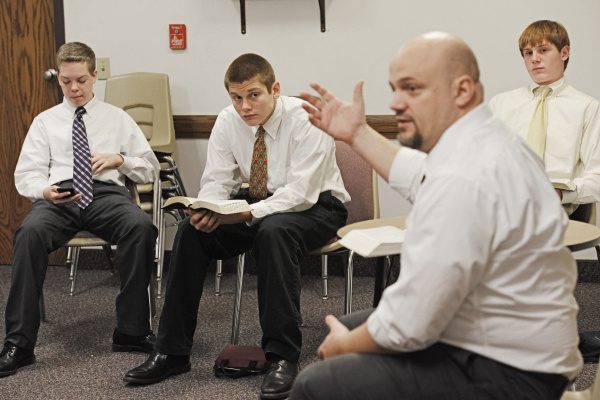
Let’s come right out and say it teaching teenagers about the gospel can seem like a downright impossible task sometimes.
They’re rowdy, and sometimes obnoxious. They tend to only come with one functional volume setting on their vocal chords, and it isn’t “inside voice.” They’re often more interested in and distracted by each other (especially classmates of the opposite sex) than the principles contained in holy scripture. Their brains just don’t work like normal human brains.
Okay, some of that is exaggerated but the struggle of many called to teach young men and young women (and sometimes both) to invite the Spirit into a room that ceases not to resist concepts like “calm” and “thoughtfulness” and “sanity” is real.
Here are some simple tips to get some of your more difficult youth lessons on track, develop an uplifting class environment and maintain it consistently.
1) Get them up and moving around
Because they’re going to move around anyway. You may as well use all of that pent-up adolescent energy in a way that solidifies the principles you’re trying to help them grasp. Be a facilitator (meaning, literally, “one who makes things easier”), not a micro-manager.
2) Look at the material through the students’ eyes
This one will require careful thought and prayer. It will require us to read the scriptures and lesson manuals through different eyes. We’ll have to dig deeper to know what questions to ask. One of the reasons teenagers can be difficult to teach is that being a teenager is difficult. It’s easy to forget that young people have different problems and care about different things than we do.
3) When appropriate, look incorporate wholesome (but contemporary) music into the lesson
If we could pick one object to describe modern adolescence, it would probably be a pair of headphones. Teens care more about music than just about anything else. It’s a great way to get them involved, and it’s also one of the only surefire ways to silence a room and invite the Spirit.
4) Get connected on social media and watch what young men and young women are talking about
Facebook really is like a public diary. Sometimes it induces a few eye-rolls, and their cyber-monologue may not always be full of grammatical diamonds, but it’s also where they’re most likely to be honest about what they feel and care about.
5) Hand out individual responsibilities before, during and after class.
Give students ownership of the lesson. This will help them feel important and activate their personal agency.
6) Learn to care about the things they care about
It may shock you how much expertise some teenagers have in their individual areas of interest. Don’t stifle productive and informative dialogue just because it strays from the lesson plan a bit. Rather, encourage them to talk about things that are important to them.
7) Group work
Regardless of the gospel topic you’ve prepared, one of the most defining things the young students in class will learn is how to effectively communicate with each other and cooperate in a group setting. Give them opportunities wherever possible to work on problems and answer gospel questions collaboratively.
8) Rely on the Spirit, and the class, more than your lesson outline.
Learn to let go of the plan and pay careful attention to what class members are thinking about. Let your knowledge of the lesson materials guide the discussion, but never stifle a comment in the interest of “getting through” the entire lesson. You may only make it through one chapter out of the five you prepared for—but what’s important is that you have a conversation that young men and women are emotionally invested in when the Spirit is present. This is the atmosphere in which the deepest learning occurs.
A word of comfort
The hours 0f effort that go into preparing these lessons are real, and they should not feel wasted. Some may experience frustration or even hopelessness, thinking not unlike the Book of Mormon prophet Abinadi that their heartfelt, unwearying efforts fall on empty ears and accomplish nothing.
The words of Elder David A. Bednar of the Quorum of the Twelve Apostles, speaking of the difficulty of holding edifying family scripture study with his young family in Oct. 2009, may provide some needed comfort:
If you could ask our adult sons what they remember about family prayer, scripture study, and family home evening, I believe I know how they would answer. They likely would not identify a particular prayer or a specific instance of scripture study or an especially meaningful family home evening lesson as the defining moment in their spiritual development. What they would say they remember is that as a family we were consistent.
Sister Bednar and I thought helping our sons understand the content of a particular lesson or a specific scripture was the ultimate outcome. But such a result does not occur each time we study or pray or learn together. The consistency of our intent and work was perhaps the greatest lesson—a lesson we did not fully appreciate at the time.








